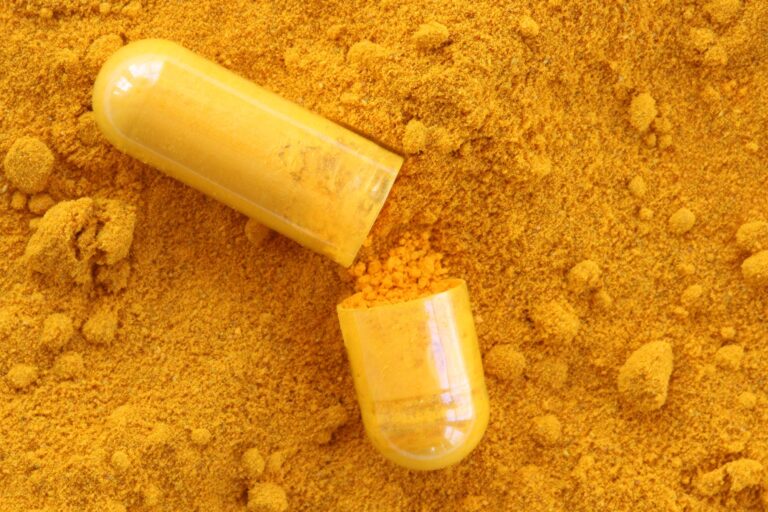
5 Menopause Support Complex Supplement to Help Ease Symptoms
Menopause support complexes are dietary supplements with herbal extracts and vitamins aimed at alleviating symptoms during menopause
Unlocking the power of curcumin and turmeric is all the rage these days. You may have noticed products on the shelves in your health food store touting the magical, health-restoring properties of these two ancient spices. But what is the science behind their potential power – and can they really deliver on their promise? Today’s post dives deep into the science of curcumin and turmeric to uncover the potential health benefits, the mechanisms of action and the latest research. Are you ready to unlock the power of curcumin and turmeric? Let’s get into the science and find out!
There are a variety of forms in which curcumin can be consumed. The most common form is by consuming turmeric, as curcumin is the main component of this spice and is known for its bright yellow color. Aside from consuming turmeric, it can also be found in capsules or pills, which provide the body with much higher doses than simply using the fresh or ground powder form of turmeric. Most supplement brands offer 95% standardized curcuminoids, meaning that 95% of the content comes from actual curcumin as opposed to other plant compounds. Derivatives of curcumin like tetrahydrocurcumin have also been used as supplements, and there are compelling arguments both for and against using these chemical derivatives versus using natural curcumin. Supporters argue that derivatives like tetrahydrocurcumin can be absorbed more easily by the body, while others argue that natural curcumin is superior due to its connection with other herbal compounds naturally found within turmeric.
The debate surrounding different forms of curcumin highlights just how complex this foundational nutrient can be and demonstrates why it’s so important to understand how different forms may affect our overall health and well-being. In the next section we will attempt to make sense of these different forms and explore the differences between turmeric vs curcumin.

Turmeric and Curcumin are two of the most powerful medicinal compounds found in nature, but the relationship between them can often be confusing. Turmeric, a member of the ginger family, contains a compound called curcumin, which is believed to be responsible for many of its health benefits. Curcumin is also available in supplement form as a separate and isolated compound.
The primary argument between turmeric and curcumin is whether or not you should take each separately, or together as part of a single supplement. Those who argue for taking both will point to the fact that while they are derived from the same plant, they function differently within our bodies. Turmeric itself is much more bioavailable within the body than curcumin alone due to its essential oils, allowing it to remain active longer in our systems, whereas curcumin is known to have an increased potency and absorption rate when consumed with other compounds such as fats or black pepper. That’s why some people look for turmeric-curcumin supplements that contain all of these components together.
On the other hand, those who argue against taking both together believe that it’s not necessary given curcumin’s increased potency when consumed with other compounds. They cite research suggesting that taking just curcumin in supplement form may be enough, as it is absorbed better on its own anyways.
Whichever option is best will depend on your individual needs and how you prefer to consume your medicine. To learn more about the potential health benefits of turmeric and curcumin, keep reading this expert article below! Coming up: “The Health Benefits of Turmeric and Curcumin”.
Turmeric and curcumin are well-known natural products that have been used in countries all around the world for millennia. They have a long history of traditional use, particularly in Ayurvedic medicine, as powerful tools for providing medicinal benefits to the body. In recent years, scientific evidence has also begun to uncover why so many cultures consider these products to be so powerful: both turmeric root extract and its main component, curcumin, may offer significant health benefits.
Some studies suggest antioxidant and anti-inflammatory properties of turmeric and curcumin, which could play a role in reducing oxidative stress in the body and protecting against chronic illnesses such as cancer and metabolic syndrome. Additionally, turmeric is thought to have antiseptic properties, which may help prevent infection. Furthermore, food that has been cooked with turmeric or has been supplemented with curcumin may have improved nutrient absorption due to its carotenoid content.
While there is emerging science behind the potential positive effects of turmeric and curcumin, it’s important to note that research still remains inconclusive on some of the claimed benefits. While animal studies look promising, more clinical trials are needed before determining the exact efficacy of these compounds for human health. Furthermore, due to individual reaction differences between individuals, some people may experience negative side effects from taking turmeric or curcumin in concentrations that are too high. Therefore, it is important to practice moderation when considering their use.

When discussing dietary benefits, it is important to bear in mind the potential health advantages that can be gained from consuming turmeric and its active component, curcumin. The antioxidant, anti-inflammatory, neuroprotective and immune-supportive properties of these substances make them a likely candidate for increasing both short-term and long-term health. Studies have suggested that the daily consumption of turmeric can help to boost one’s immunity, reduce inflammation, protect against certain cancers, improve digestion, balance cholesterol levels and even enhance cognitive function.
Yet it is always important to remember that these health benefits are based on isolated case studies and that more research is needed in order to ascertain whether such claims are indeed valid. Furthermore, it is essential to remember that turmeric should always be consumed alongside other fresh fruits and vegetables in order to maximize the potential for benefit. While it may be tempting to ingest high doses of turmeric in hopes of experiencing a more dramatic effect, such actions could actually prove detrimental to one’s overall wellbeing; consuming excessive amounts of turmeric routinely can put undue strain on vital organs such as the liver or kidneys. For this reason, moderation should always be observed when enjoying this beloved root.
Having discussed the potential dietary benefits – both positive and negative – associated with turmeric and curcumin consumption, we now turn our attention to a discussion of the science behind these two impressive components.
Turmeric and its active component, curcumin have antioxidant, anti-inflammatory, neuroprotective and immune-supportive properties that can lead to improved health. However, benefits are based on isolated studies and more research is needed to ensure the validity of claims. Furthermore, turmeric should be consumed in moderation with other fruits and vegetables in order to maximize its potential benefits. Finally, a discussion of the science behind turmeric and curcumin will follow.
Turmeric and curcumin have long-been used for their therapeutic benefits, being part of the traditional medicine system in South Asia for centuries. In recent years, modern studies have investigated the chemical and pharmacological effects of turmeric and curcumin on many diseases, ranging from cancer to neurological and inflammatory disorders.
The root of Turmeric has been shown to contain several compounds that are known to have medicinal properties. Curcuminoids are compounds found in turmeric that appear responsible for much of its therapeutic activity. The main curcuminoid is curcumin, which gives turmeric its yellow-orange hue. Other constituents include diarylheptanoids such as desmethoxycurcumin and bis-desmethoxycurcumin, along with volatile oils such as tumerone, atlantone and zingiberene.
The health benefits associated with turmeric are more often attributed to its active ingredient, curcumin. Studies have particularly highlighted the powerful anti-inflammatory effects of curcumin stemming from inhibiting cyclooxigenase (COX) enzymes – key mediators of inflammation – within the body’s cells. Furthermore, this compound has a wide range of applications due to its scavenging activities against free radicals and its potential to boost cell communication mediated by hormones.
Although researchers suggest there may be potential medical applications for turmeric/curcumin, it must also be noted that evidence showing a benefit to humans is still mostly based on results from animal studies or laboratory experiments using cell lines grown in test tubes. Studies in humans have been limited in size or conducted over short time periods making drawing definitive conclusions on certain health issues difficult. Therefore, more research is needed before conclusive recommendations can be made with regards to the medicinal use of turmeric/curcumin in humans.
Overall, research provides promising evidence that turmeric/curcumin has a wide range of beneficial properties in preventing and treating a variety of human diseases. To further understand these healing properties and unlock the power of turmeric/curcumin we now turn our attention to the active compounds and ingredients found in this amazing plant extract.

Turmeric has a long history of use in traditional Ayurvedic medicine for its purported therapeutic effects. It is the main ingredient of curcumin, a polyphenol derived from the spice turmeric. Curcumin is commercially available as curcuminoids, an extract containing three major active compounds known as curcumin, desmethoxycurcumin, and bisdemethoxycurcumin.
Curcumin showed higher antioxidant potency than many other plant phenols due to its strong ability to scavenge free radicals. This makes it an effective anti-aging compound. In addition to this, curcuminoids have anti-inflammatory, anticancer, antifungal, antiviral and antispasmodic properties. Curcumin also has hepatoprotective, nephroprotective and gastroprotective properties.
However, some researchers have argued that the beneficial properties of turmeric are largely due to its aromatic volatile oils rather than its polyphenol content. These constituents are found mainly in the essential oil fraction but are also present in smaller amounts in the dried root powder. The data on the impact of these oils is mixed and may depend on which specific oil or combination of oils is used in any given study.
In conclusion, there is evidence to suggest that turmeric’s beneficial properties are likely due to the synergistic actions between multiple compounds found within the plant material – both polyphenolic and non-polyphenolic components (e.g., essential oils).
Having established the active compounds and ingredients in turmeric and curcumin, we can now focus on exploring pharmaceutical and nutritional effects of these compounds on our bodies.
The potential health benefits of curcumin, the primary active compound found in turmeric, have been studied extensively. It is thought to possess anti-inflammatory and antioxidant properties and is being investigated as a pharmaceutical agent for treating a number of conditions including depression, cardiovascular disease, and type 2 diabetes. Moreover, there is evidence to suggest that curcumin can reduce liver damage associated with some drugs and toxins and may be effective in preventing or treating cancer.
When looking at the potential pharmaceutical effects of curcumin, it is also important to consider its nutritional value. Turmeric has traditionally been used in India as part of Ayurvedic medicine, with practitioners recommending its use for improving digestion and joint mobility as well as skin conditions such as eczema and psoriasis. Additionally, turmeric is rich in vitamins and minerals such as iron, potassium and magnesium, all of which are important for maintaining optimal health.
The debate about whether the pharmacological or nutritional effects of turmeric are more beneficial remains ongoing. Proponents of one side argue that curcumin’s anti-inflammatory properties provide greater medicinal potential than any dietary supplements could offer. On the other hand, nutritional experts argue that by consuming turmeric as part of a balanced diet, individuals are able to optimize their overall physical health while also receiving the medical benefits attributed to curcumin.
In conclusion, both sides hold valid points on the relative value of either nutritional or pharmaceutical effects of turmeric and curcumin. Moving forward now to the healing effects of curcumin is essential in order to continue understanding the potential implications that this natural supplement holds for both our overall health and specific medical conditions.
The healing effects of curcumin, the active compound in turmeric, have been widely lauded in recent years. While more scientific research is still needed to understand the full potential of this powerful ingredient, many believe that its antioxidant and anti-inflammatory properties may offer a range of health benefits. According to a review published in 2018, curcumin may be helpful in treating conditions from mild gastroenteritis to neurodegenerative diseases like Alzheimer’s.
When it comes to using curcumin for medicinal purposes, there are two camps: those who advocate for its use as a natural remedy, and those who caution against unsupported evidence and potential risks associated with its use. On one hand, taking turmeric or glucosamine products with curcumin as an ingredient may help reduce inflammation caused by long-term diseases like arthritis. There is also evidence that taking curcumin supplements can reduce pain after exercise and improve digestive health by helping to decrease symptoms of Irritable Bowel Syndrome (IBS). On the other hand, some medical experts caution against assuming that natural supplements work for everyone and suggest that long-term use of any supplement should be discussed with your doctor.
In conclusion, while the healing effects of curcumin remain an area of debate among experts within the medical community, the research available so far suggests that it is worth considering as part of a balanced diet. In the next section, we will explore the long-term benefits of incorporating curcumin into your daily routine.
The long-term benefits of curcumin are incredibly vast. From aiding in overall health to being an anti-inflammatory powerhouse, curcumin has been studied for its role in helping manage chronic illnesses such as cancer and arthritis.
Curcumin’s role as a potent antioxidant makes it a powerful protector against illness, especially chronic conditions that develop over time due to toxins and free radicals in the body. As an antioxidant, curcumin helps block the action of free radicals that can damage cells and lead to tissue inflammation and disease. Curcumin is also believed to reduce inflammation that can contribute to many chronic illnesses. Several studies suggest that curcumin has anti-inflammatory effects, which may make it beneficial for people experiencing joint pain associated with conditions such as osteoarthritis or rheumatoid arthritis.
Curcumin has also been linked to improved cognitive function and overall brain health. Increasing evidence suggests that curcumin can help improve memory, reduce anxiety, and protect against age-related mental decline. It’s thought that curcumin stimulates nerve growth factor (NGF), which helps preserve neurons in the brain. Additionally, research suggests that curcumin may have neuroprotective properties for people with Alzheimer’s disease and other forms of dementia.
Study participants have also found long-term cardiovascular benefits from taking curcumin. It may help regulate cholesterol levels in the body, making it easier for the heart to pump blood throughout the body. Research suggests that consuming turmeric or taking supplemental curcumin may help reduce plaque buildup in arteries and decrease total blood cholesterol levels. Additionally, some studies indicate that it can prevent narrowing of arteries due to atherosclerosis.
While many experts applaud the potential long-term benefits of curcumin consumption, there is still limited research available in humans on its effectiveness over longer periods of time. Further research needs to be done before we know exactly how useful this supplement is for long-term health concerns. Additionally, not all forms of turmeric are equally effective so if considering trying it out, consult your healthcare provider on reliable sources and dosage information beforehand.

The amount of turmeric/curcumin you should take to experience the health benefits really depends on what you’re trying to treat and your individual needs, so it’s best to speak to a trusted healthcare professional if you’re considering supplements. Studies generally point to anywhere between 500-2,000 milligrams of turmeric extract per day, but always follow the directions provided by the supplement manufacturer and consult with your physician before starting any new supplement routine. Curcumin, the active component of turmeric, is not as well studied as turmeric and research recommends taking 200-6,000 milligrams daily for preventative use or up to 12,000 milligrams daily if treating a condition. Again, always follow the instructions provided by your doctor and supplement manufacturers and monitor your own symptoms carefully when beginning any new routine.
The evidence for the health benefits of turmeric and curcumin is overwhelming. Studies have found that turmeric and curcumin possess antioxidant, anti-inflammatory, anti-apoptotic, anti-mutagenic, anti-bacterial, and anti-cancer properties. Numerous research studies have demonstrated the ability of turmeric and curcumin to reduce inflammation in a multitude of conditions from arthritis to cancer. It has also been shown to help protect cells from oxidative damage, improve cardiovascular health by reducing bad cholesterol levels, enhance immunity and boost cognitive function. Additionally, several clinical trials have reported positive results when it comes to using a combination of turmeric and curcumin for various diseases such as psoriasis, diabetes, Alzheimer’s disease, and arthritis. Furthermore, research shows promise that turmeric and curcumin could potentially play a role in decreasing risk factors associated with metabolic syndrome when taken in higher doses. Generally speaking, there is more than ample evidence to suggest that turmeric and curcumin may be beneficial for numerous health conditions.
Yes, turmeric and curcumin can have adverse effects if taken in excess. Consuming too much could cause stomach pain and acid reflux due to the high concentration of active compounds. Additionally, it can act as a blood thinner so people with bleeding disorders should avoid using it. People taking certain medications or supplements should also check with their doctor before taking turmeric or curcumin as the combination may interact and lead to undesired effects. Finally, some people may experience skin rashes due to sensitivity to turmeric or its active compounds, so discontinuing use is usually recommended.

Menopause support complexes are dietary supplements with herbal extracts and vitamins aimed at alleviating symptoms during menopause

Vitamin C, D3, Zinc, and Quercetin support immune health. They enhance immune cell function, fight infections, reduce inflammation, and provide antioxidant benefits.

Ginseng, a valued herb with adaptogenic and antioxidant properties, is popular as a supplement for improved well-being, energy, and immune function.

Nootropic supplements enhance focus, memory, and cognitive function. They boost mental clarity, motivation, and creativity for improved performance and brain health.

Garcinia cambogia, a tropical fruit, is touted for weight loss. Its active ingredient, HCA, may inhibit fat formation, but evidence is limited. Consult a professional before use.

More and more people are jumping on the mushroom supplement bandwagon these days, but you should be aware that there are potential side effects you should know about before taking the plunge. Whether you’re begging for overall well being or looking for an extra performance boost, you’re going to want to make sure you’re making an informed decision before adding mushroom supplements to your daily routine. We’ve put together a list of potential side effects to look out for, so read on and learn the truth before you start popping those pills.

Moringa, the “miracle tree,” offers numerous benefits. Moringa supplements provide essential nutrients, antioxidants, anti-inflammatory effects, and potential blood sugar and cholesterol regulation. They support immunity and combat malnutrition, but medical advice is essential.

It’s a good thing that Mother Nature both created and found cures for many of the ailments we humans suffer from. From the common cold to serious diseases, herbs have the potential to not only alleviate symptoms, but to completely prevent illnesses in the first place! Herbal remedies for immune system support have become increasingly popular as natural ways to boost your immunity against illness start to catch on.
